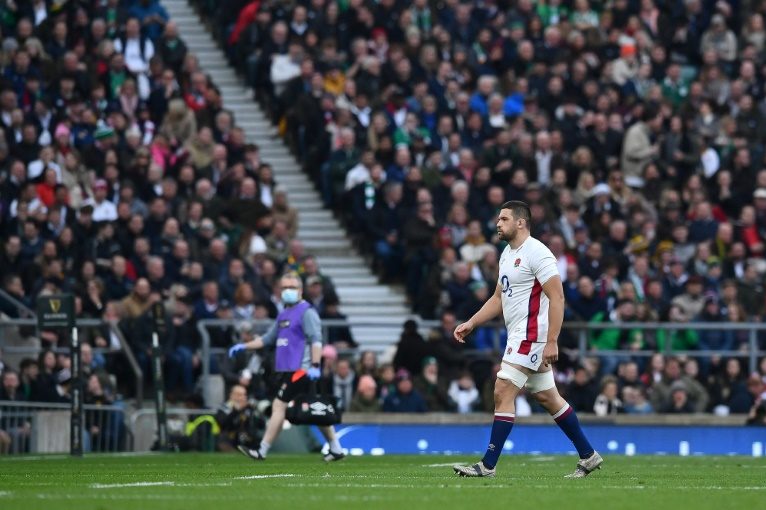Either safety is the top priority, or rugby is the top priority. You cannot have both, writes SA Rugby magazine editor ZELIM NEL.
To those who cheered the sending off of England lock Charlie Ewels for an accidental collision with James Ryan, all in the name of safety, why stop at a red card?
If safety is of such paramount importance, and rugby players are at serious risk of brain damage, why are you not calling for matches to be suspended the instant there’s a head-to-head hit?
Or, better yet, eradicate contact altogether?
Don’t be silly, you say – well, at what point has sufficient action been taken to ensure ‘safety’?
What would have happened if Ewels had not been sent off and instead Ireland had been awarded a penalty? Would Ryan, seeing his counterpart remain on the field, suddenly have collapsed?
Of course not.
Sanctions are in place to shape behaviour, discouraging one and encouraging another. Defenders don’t keep their hands out of the ruck because they want the attackers to have a fair shot at generating quick ball, they do it because they don’t want to concede a penalty.
The unprecedented spike in players being sent off for ‘dangerous tackles’ is indicative of two things – the sanction is not shaping behaviour, and the sanctioned behaviour is almost always beyond the control of the offending players, as was the case with Ewels.
See the inadvertent head clash between Vodacom Bulls flyhalf and Sharks scrumhalf Grant Williams which ended with a suspension that 62% of readers thought was outrageous.
The counter-argument from some is that a player’s intention is irrelevant and he should be sanctioned for the outcome because the experts say concussions are a grave threat to players.
Interestingly, the white knights driving this line were eerily silent when the same experts implemented the galactically stupid nipple-line tackle which, among other changes, inadvertently but predictably drove up concussion cases.
Who at World Rugby has resigned over this? By the same logic, it doesn’t matter that they tried to reduce concussions, the bottom line is that they achieved the opposite outcome.
Why are rugby players accountable for the decisions of experts, which the experts themselves are not accountable for?
If offered an opportunity to vote in an anonymous and independent survey, I have no doubt that the majority of Test players across the globe would tell the labcoats to get their commissioned fingers out of rugby so that the players can get on with taking control of the gainline.
The gainline is where the game of rugby is won or lost and this is why it’s the area of the contest that features the biggest collisions.
I used the word ‘feature’ because collisions are a highlight of the sport. Without big men running into each other at speed to create the spectacle of unusually big collisions, the sport would be as well supported as touch rugby.
Name the captain of South Africa’s touch-rugby team? You can’t because there is insufficient interest in touch rugby to warrant the sport turning professional, being broadcast and therefore being promoted. It has everything real rugby has, minus the physicality.
Rugby’s disingenuous subservience to the media-driven narrative around player safety is flirting with disaster.
In an effort to tap-dance for fear-mongering powerbrokers, rugby bosses are jeopardising the future of the sport.
American football players and fans are seldom impressed by rugby’s ball skills and evasive running, but almost without fail they comment on the physicality of a sport played without helmet and pads.
Indeed, rugby is not safe; that is, if you compare it to table tennis. It is, however, much safer than many other professions where those employed to undertake dangerous tasks are paid accordingly.
Why is a firefighter or a commercial diver allowed to take on the risks associated with their job, but rugby must be safer?
The NFL has paid out almost $1 billion in concussion settlements primarily because that league hid from the players the findings of their own research into the risks around concussions in gridiron football, not because players suffered concussions.
Athletes are concussed in other sports at a far higher rate than rugby. Combat sports are not the subject of class-action lawsuits because, like rugby, they’re not guilty of hiding the risks.
Rugby is by nature a dangerous sport. It’s also not compulsory.
Clearly, the benefits of a professional career far outweigh the negatives based on the hundreds of thousands of men who spend their youth striving to earn a pro contract.
Matfield: laws must be changed after ‘crazy’ red card
Any and all measures to protect players should indeed be considered and implemented, right up to the point where it threatens the nature of the contest. At that point, players must have the freedom to decide whether they want to take the risks involved.
The alternative is that the risk is transferred to an audience that is increasingly deciding it’s not worth tuning in or turning up to watch a sport where there’s a good chance the referee will ruin the contest by sending players off as a tribute to the safety narrative.





